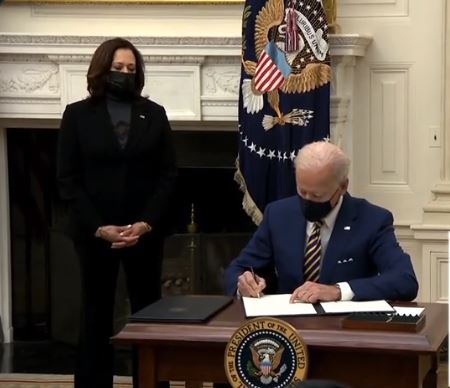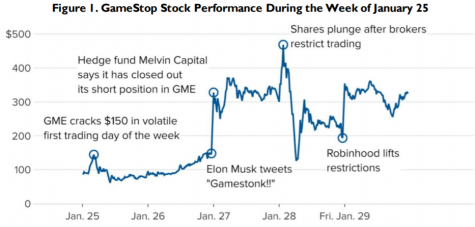GOP Senators Propose Counteroffer Stimulus Package

Photo Courtesy of the U.S. federal government
President Joe Biden and Vice President Kamala Harris signed two Economic Relief Bills for the COVID-19 pandemic on Jan. 22. The bill was signed in an attempt to extend unemployment benefits as well as raise the minimum wage for federal workers to $15, according to CNN.
Update (02/05/21) 1:28 p.m.:
Vice President Harris broke a 50-50 Senate vote to approve the American Rescue Plan, at a publicly-accessible virtual roundtable on Feb. 5. The move comes after the Senate passed a budget resolution on the same day, putting the bill on the path to approval without needing GOP support, according to CBS News.
After a series of congressional meetings that will take place during the next few weeks, the American Rescue Plan is expected to take effect by mid-March, according to the Los Angeles Times.
—
GOP lawmakers unveiled a new $618 billion stimulus package on Jan. 31. The move comes after President Joe Biden unveiled the $1.9 trillion American Rescue Plan on Jan. 14, pushing for more economic stimulus and the reopening of schools during the COVID-19 pandemic, according to the Washington Post.
Biden’s plan includes $1,400 stimulus payments to an unspecified economic demographic of adult dependents, a temporary increase in Child Tax Credits, more funding for unemployment benefits and an increase in the federal minimum wage to $15 an hour. The plan also allocates $350 billion to accelerate vaccine distribution and employ frontline workers, $170 billion to provide hygiene resources necessary to safely reopen schools and $70 billion to increase COVID-19 testing and vaccine development, according to CNN.
The GOP counteroffer is less than one-third the cost of Biden’s $1.9 trillion relief package.
“No one should live under the living wage, and unfortunately our current minimum wage does not suffice for many, many people,” senior and former minimum-wage worker Rishav Sen said. “Rent prices are extreme, food is extremely difficult to come by in healthy portions … $15 is a step in the right direction, but it’s nowhere near the goal we need to be at.”
A group of ten GOP lawmakers approached Biden with the new stimulus proposal, citing the costliness of the $1.9 trillion stimulus package and the subsequent financial burden on American taxpayers in a time of economic distress, according to Forbes.
“Mr. President, we recognize your calls for unity and want to work in good faith with your Administration to meet the health, economic and societal challenges of the COVID crisis,” the senators said in a joint statement on Feb 1. “In the spirit of bipartisanship and unity, we have developed a COVID-19 relief framework that builds on prior COVID assistance laws, all of which passed with bipartisan support.”
The GOP proposal includes $1,000 stimulus payments to individuals earning less than $40,000 and couples earning less than $80,000 a year. The proposal also allocates $160 billion to COVID-19 response and vaccine distribution, $132 billion to fund unemployment benefits, $40 billion to fund childcare and school reopenings, and $50 billion in aid for small businesses. No state and local aid nor federal minimum wage increase is included, according to ABC News.
No one should live under the living wage, and unfortunately our current minimum wage does not suffice for many, many people. Rent prices are extreme, food is extremely difficult to come by in healthy portions … $15 is a step in the right direction, but it’s nowhere near the goal we need to be at.
— Rishav Sen
“In order for the economy to be stimulated, people do need to put that money somewhere, whether it’s spending it by paying their rent or buying groceries or buying dinner or putting it into a bank that then is loaned out to someone else,” economics teacher Kathryn Beechinor said. “It really does help stimulate the economy. It’s when you just hold on to it and don’t put it anywhere that it does have that negative effect.”
In the Senate, 60 votes are typically needed to move forward immediately with new legislation. However, the Biden administration can move forward with a 51 Senate vote majority through “budget reconciliation,” a process that blocks Senate filibustering and allows the passage of the new legislation without a 60-vote supermajority. Reconciliation would leave out GOP lawmakers in their fight against Biden’s stimulus package, according to CBS News
The Biden Administration will not come to a compromise with the GOP lawmakers, according to White House press secretary Jen Psaki at the press briefing on Feb. 1. Senate Majority Leader Chuck Schumer and House Speaker Nancy Pelosi filed a joint budget resolution for Biden’s stimulus package on Feb. 1, marking the first step in the bill’s passage without GOP input.
Your donation will support the student journalists of Portola High School. Your contribution will allow us to purchase equipment and cover our annual website hosting costs.

Ryne Dunman is the Co-Editor-in-Chief for his second and final year on the Portola Pilot. This year, he’s excited to make new memories in-person and...

Arnav Chandan is the Sports Editor and Co-Business Manager for his second and final year on the Portola Pilot. Outside of spending hours upon hours in...












